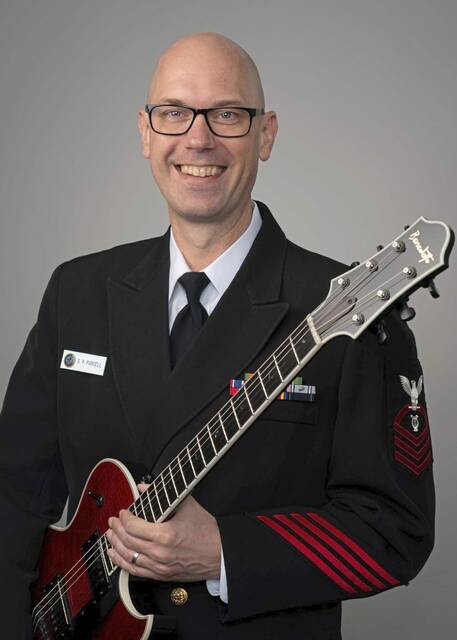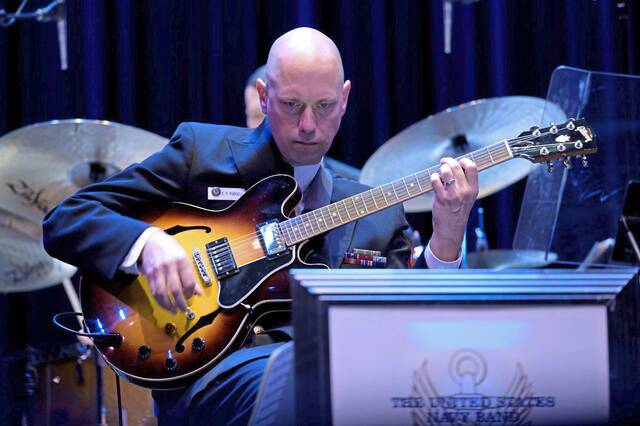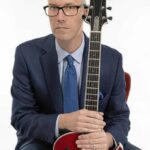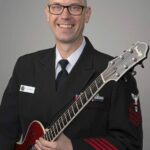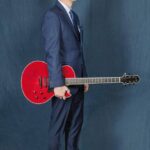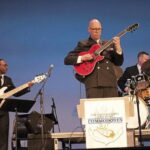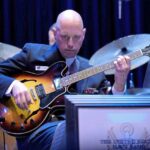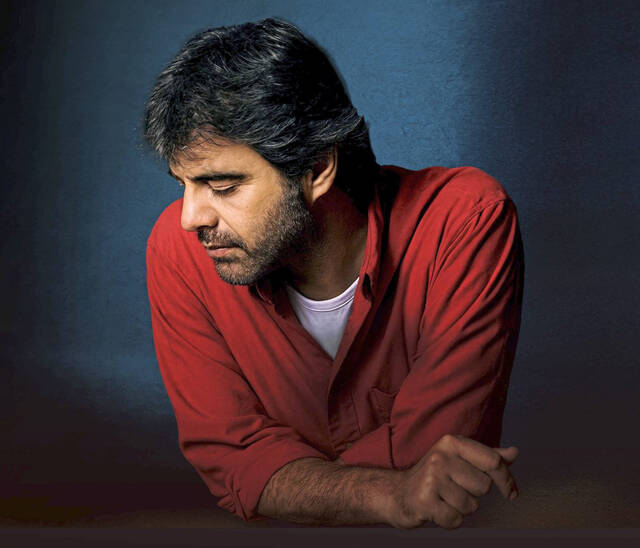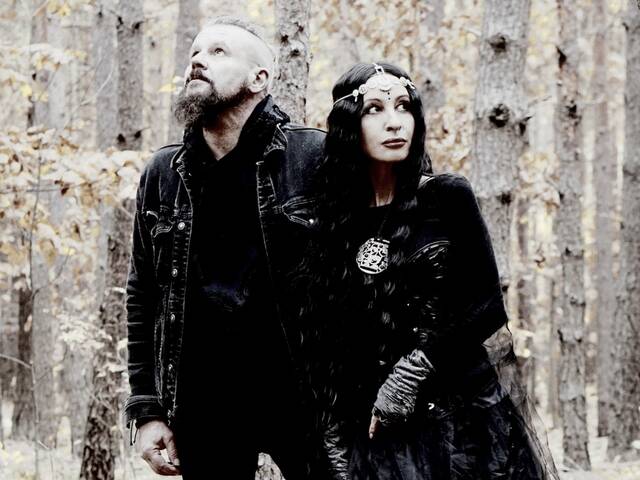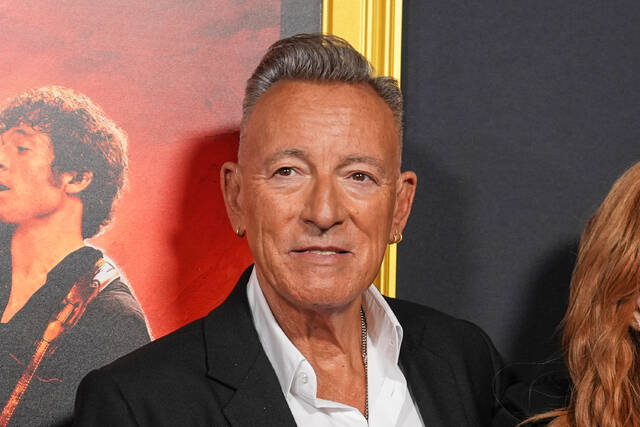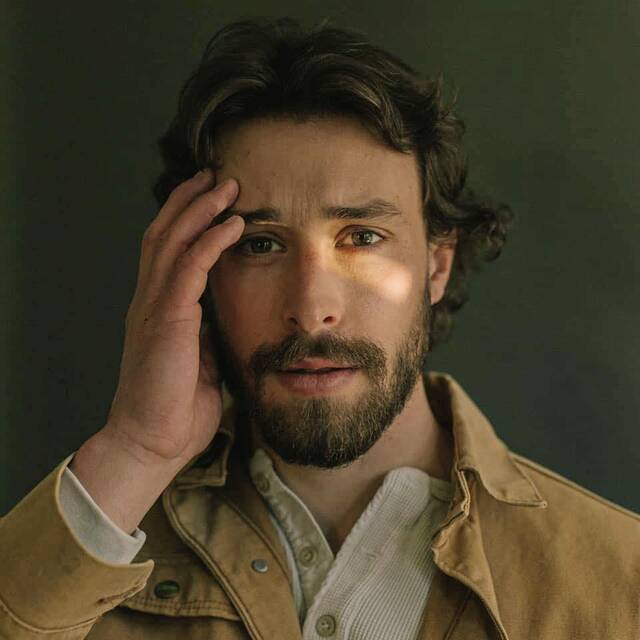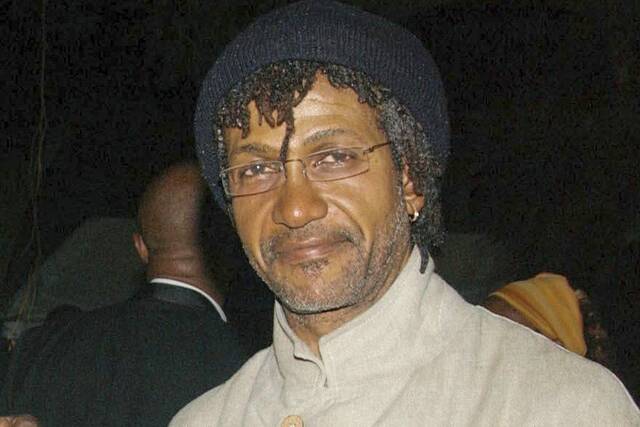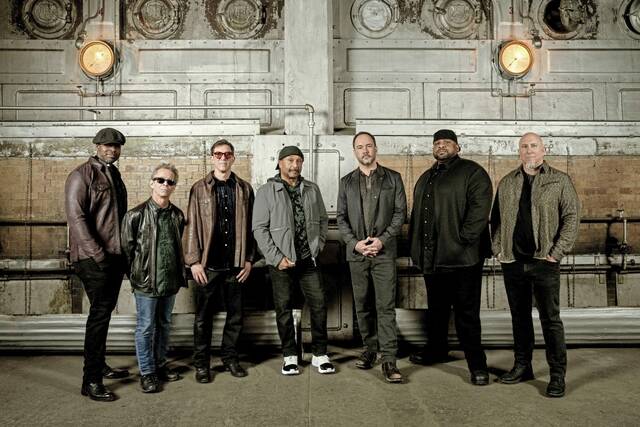Shawn Purcell doesn’t remember the precise moment he decided to become a professional musician.
He does know that it was during spring 1989, his senior year at Baldwin High School. Purcell had been accepted to the University of Ohio and planned to major in business and pre-law.
Then, a switch just kind of flipped.
“I decided, pretty last-minute, ‘I don’t want to do this. I want to go to music school,’ ” said Purcell, 52, who today sports a shaved head and black-rimmed glasses, and lives in Fairfax County, Va., about 20 miles southwest of Washington, D.C.
“I had essentially missed every deadline … but Duquesne (University) was kind, they let me audition and my path started there,” Purcell said. ”I think I always wanted to play music on a certain level. I was pretty obsessed, I’d say right out of the gate … the guitar was always a focal point.”
A third-generation musician, Purcell has played for circus crowds, American presidents and dignitaries. For 20 years, he’s toured the nation, playing jazz guitar in military bands. As a professor at George Mason University in northern Virginia, he’s instructed dozens of aspiring six-stringers. And he’s produced and appeared on a number of records — including two solo ones, with plans for a third already in the works.
Purcell also is entering the next stage of his musical journey. The Baldwin-bred musician, who’s never forgotten his roots, is set to retire his post June 30 with the U.S. Navy Band Commodores Jazz Ensemble.
“The Purcells are like musical royalty,” laughed Mark Koch, 69, of Carrick, who taught countless numbers of jazz guitarists — including Shawn Purcell — during a 35-year Duquesne University career that ended with his retirement in 2020. “He’s a consummate musician. I think Shawn has worked really hard to be where he’s at.
“The kid’s really damn talented.”
Family ties
To say Purcell’s family has musical tendencies is an understatement.
Purcell’s father, Randy, played trombone in the same Navy jazz ensemble as his son — just 40 years earlier. He also played and recorded LPs with icons like Canadian trumpeter Maynard Ferguson and appeared on TV shows such as Merv Griffin.
His grandfather, Jack, also worked the trombone, wowing fellow soldiers during World War II and, through decades after that, at Pittsburgh “society gig” haunts like Oakland’s University Club.
“That’s when music was music,” laughed guitar legend Joe Negri, 97, of Scott Township, a staple for decades on the Pittsburgh scene who played in trios and quartets with Jack Purcell. “We did the standards. It wasn’t bebop or jazz but it was good, society tunes … and I enjoyed the Purcells. They were great!”
Piano was the instrument of choice for Purcell’s aunt, Leslie Upchurch, a music educator in the New York City area.
The same went for Purcell’s uncle, Rick, who still books live gigs playing piano and keyboards; a magazine crowned him “The Music Man” about 10 years ago.
Purcell, himself, started reading music when he took on the piano at age 5. At 12, though, he swapped it out for his real first love: the guitar. During his first guitar lesson, Purcell remembers playing Led Zeppelin’s “Stairway to Heaven.”
“Since my family was a bunch of musicians, I’d pick up stuff,” Purcell said. “I was always working on it and surrounded by it.”
He played his first live gig a few years later, around 1986 he estimated, as the guitarist for the band Pantara — no relation to the metal group Pantera — at a Baldwin club dubbed The Foggy Bottom. Hundreds of people attended.
Everything changed at Duquesne University, when Purcell stopped flirting and instead started to pursue music seriously as a vocation.
Marlane Romanos, Purcell’s mother, said the transition was natural. “Easy, as a matter of fact.”
“I could see that was his happiness,” said Romanos, 74, of Baldwin, who remarried more than 30 years ago. “He was following in everybody’s footsteps and he was all about it.”
At Duquesne, Purcell studied “applied guitar” one-on-one with professional jazzmen like Koch and Ken Karsh and, around 1990 or ‘91, joined Late Edition, a jazz-fusion quintet featuring pianist Scott Anderson.
Purcell wrote almost all of Late Edition’s original songs, Anderson said. The band kept playing them after Purcell left for the circus, until they broke up in 1998.
“One thing that became obvious about Shawn was his deep well of creativity,” said Anderson, 58, of Upper St. Clair. “Shawn’s creativity hasn’t abated. He’s still cranking out new music that is imaginative and exciting. He’s a brilliant writer, virtuosic soloist, and one of the nicest, kindest and funniest guys on the scene.”
Koch, the Duquesne guitar instructor, said even in Purcell’s nascent college days, the young player “definitely had natural ability.”
“As a teacher, you’re aware of that,” Koch said. “But you’ve got to fill in the gaps, enhance his skills.”
Koch also taught discipline and tried to inject variety into his students’ repertoire.
“‘I want to just play jazz,” some students would say. “OK,” Koch said he would respond, “Do you want to pay your rent?”
“You need to be a working musician,” Koch said. “You never know what you’re gonna get hired for.”
Purcell graduated from Duquesne in 1993 with a bachelor of music in recording arts and sciences. He quickly took a gig playing guitar during a two-year tour with The Ringling Bros. and Barnum & Bailey Circus.
By 1996, though, a different path presented itself: performing music with the Armed Forces.
Military music
Purcell returned to Pittsburgh and heard the Airmen of Note, the U.S. Air Force’s jazz ensemble, was hunting for a new guitarist. His grandfather encouraged him to mail in a cassette. Around July 1996, he trekked to Washington, D.C., to audition.
He went on to play with the Airmen for eight years — and it was there that he met his future wife, Darden, a singer with the group.
In the early 2000s, the Purcells left for Nashville, where Purcell launched a jazz combo and paid the bills through private jazz guitar instruction. He also taught at Middle Tennessee State University.
Then, they relocated to Champaign, Ill., where Purcell earned a doctorate of musical arts in jazz performance at the University of Illinois. Purcell’s 160-page thesis tackled Peter Bernstein, a New York City musician he called “one of the greatest living jazz-guitar players.”
The military again provided a door — and Purcell walked through it. In December 2011, he enlisted, this time in the Navy, to play in the Naval Academy Band. The Commodores gig followed in August 2013.
“(Purcell’s) musical contributions to the Commodores and his willingness to give his vast musical talent to the service of his country truly set the example for those that are following him,” said Capt. Kenneth Collins, commanding officer of the U.S. Navy Band.
Purcell estimates that, since joining the Commodores, he’s played about 90 shows a year for 13 years, most of them “high-level military events.”
Purcell doesn’t remember the first time he played at the White House. But he estimates, due to his resume, it was during Bill Clinton’s presidency. In the years since, he’s played for every president since Clinton — both Democrats and Republicans.
Vice presidents, too, are no strangers to Purcell. He recently performed a holiday set at Vice President Kamala Harris’ home.
“When you first do it, there’s an awe,” he laughed. “But, kind of like everything, after a while, you’re just playing again at the White House.”
“I still get excited when he tells me he’s playing at the White House or the vice president’s home,” Romanos laughed.
Purcell said he doesn’t have any crazy stories about elected leaders — but he does get to see them a lot behind the scenes, as real people. He remembers being called on less than a day’s notice to play at the home of former Secretary of Defense James N. Mattis, who served under President Donald Trump from 2017 to 2019.
“(Mattis) came downstairs and said, ‘I’m really sorry this happened last-minute and I’ll try to do better next time!’” Purcell said. “It was endearing.”
Storied career
Purcell’s been playing with the Commodores for more than a decade now. That’s included performances for everything from ceremonies with dignitaries and educational clinics at schools to funerals at Arlington National Cemetery.
Since returning to Washington, D.C., he’s also worked as an adjunct professor of jazz guitar and jazz arranging at George Mason University in Fairfax, Va. Darden directs the jazz studies program there.
Purcell has hugely influenced his wife’s records, on which he appeared, arranged songs and served as co-producer, she said. Origin Records released Darden Purcell’s third LP as a bandleader, “Love’s Got Me In a Lazy Mood,” in September 2023 to critical acclaim.
Purcell has appeared on some 40 recordings. Origin Records released his second LP as a bandleader, “180,” in 2022.
“It’s a great partnership — both with the music and with the marriage,” said Darden Purcell, 48, who plotted out a career in marketing and advertising before pursuing music.
“It is a job and, like any job, it can weigh you down,” she added. “But Shawn’s creative juices are always flowing … and that’s very inspiring to me.”
Darden also jokes that her husband is “all in, all the time” — and that’s helped with her recordings and career, too.
“He’s an incredible musician,” she said. “He knows my voice. He knows my range. And he knows what I like.”
Despite a tough schedule, Purcell still reflects positively on his time in military bands,
“Not a lot of people have jobs where they have a career and still get money afterward,” he laughed. “That is something I’m super grateful for.”
In recent years, Purcell became an endorsed artist for Benedetto Guitars, which custom-built the instruments. He also sponsored by D’Addario Strings, Ted Weber Loudspeakers, and Tomas Jackson Musical Electronics.
With the high cost of living in Washington, D.C., Purcell jokes that his upcoming military “retirement” is one in name only. He plans to continue teaching and performing after his time with the Commodores ends this summer.
“I think, when I was 12 or 13, I wanted to be a rock star, I wanted to be in Motley Crue, touring the world,” Purcell said.
Inadvertently, performing in military bands become another kind of family tradition.
“It wasn’t something I sought out,” he said. “It just kind of happened.”
Note: This article has been updated to clarify the years that Purcell has performed in military bands, and corrected details about his mother re-marrying and that he taught at Middle Tennessee State.



